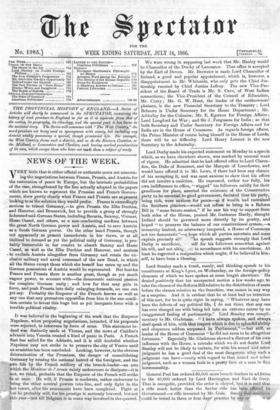Lord Derby made his expected statement on Monday in a
speech which, as we have elsewhere shown, was marked by unusual want of vigour. He admitted that he had offered office to Lord Claren- don, the Duke of Somerset, and the Marquis of Lansdowne, and would have offered it to Mr. Lowe, if there had been any chance of his accepting it, and was most anxious to show that his offers did not involve a coalition. He expressed, rather too fully, his own indifference to office, "wigged" his followers mildly for their greediness for place, asserted the existence of the Conservative party to be essential to good government, declared that his party, being rich, were anxious for peace—as if wealth had restrained the Southern planters—would not refuse to bring in a Reform Bill in " some future session," if he saw his way to support from both sides of the House, praised Mr. Gathorne Hardy, thought Ireland should be governed more directly by its gentry, and hoped "to preserve the balance of our constitutional system,—a monarchy limited, an aristocracy tempered, a House of Commons not too democratic"—a hope which all parties entertain and none explain precisely ali1. The speech suggests strongly that Lord
Derby is sacrificiir, self for his followers somewhat against his will, and not altog in accordance with his convictions. At least he regretted a resignation which ought, if he believed in him- self, to have been a blessing.






























